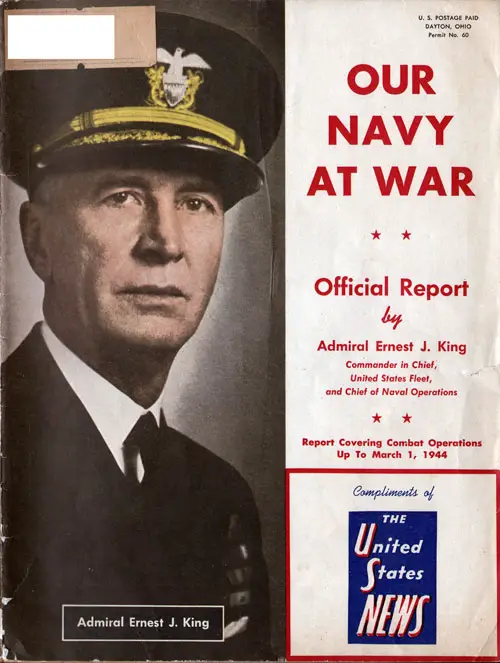Introduction - Our Navy at War - 1944

Front Cover, Our Navy at War, Official Report by Admiral Ernest J. King, Commander in Chief, United States Fleet, and Chief of Naval Operations. Report Covering Combat Operations Up to 1 March 1944. GGA Image ID # 1d6884da59
The United States has been engaged in a worldwide war for more than two years. Our geographical position, wealth, resources, and industrial development, combined with an unfaltering will to victory, have established and enhanced our position as one of the dominant powers in the United Nations.
As such, we have been closely and deeply involved with our Allies in all the political, economic, and military problems and undertakings which constitute modem war. Historically, the conduct of the war by allies has rarely been effective or harmonious.
The record of the United Nations during the past two years has been unprecedented, not only in the extent of its success but in the smooth working and practical cooperation by which it has been accomplished.
As one of the United Nations, the United States has reason to be proud of the inter-Allied aspects of its conduct during the war during the past two years.
As a national effort, the war has shown the complete dependence of all military undertakings on the Nation's full support in the fields of organization, production, finance, and morale. Our military services have had that support to a full degree.
The Navy has also had full support from the Nation concerning manpower. Personnel of our regular Navy, who, in times of peace, serve as a nucleus for expansion in times of war, now represent a small portion of the total number of officers and men.
About ninety percent of our commissioned personnel and eighty percent of our enlisted personnel are Naval Reserves. They have successfully adapted themselves to active service in a comparatively short time.
Thanks to their hard work, training, and will to become assets, their performance of duty has been uniformly as excellent as it has been indispensable to our success.
As to the purely military side of the war, there is one lesson that stands out above all others. Modern warfare can be effectively conducted only by the close and effective integration of the three military arms, which make their primary contribution to the military power of the Nation on the ground, at sea, and from the air.
This report deals primarily with the Navy's part in the war, but it would be unwarranted.
However, an unintended distortion of perspective did not allow the Navy to record here its full appreciation of the efficient, whole-hearted, and gallant support of the Navy's efforts by the ground, air, and service forces of the Army, without which one would have never written much of this story of the Navy's accomplishments.
During this report, the Navy, like the full military power of the Nation, has been a team of mutually supporting elements.
The Fleet, the shore establishment, the Marine Corps, the Coast Guard, the Waves, and the Seabees have done their parts. Each has earned an individual "well done"—but hereafter is all included in the term "The Navy."
